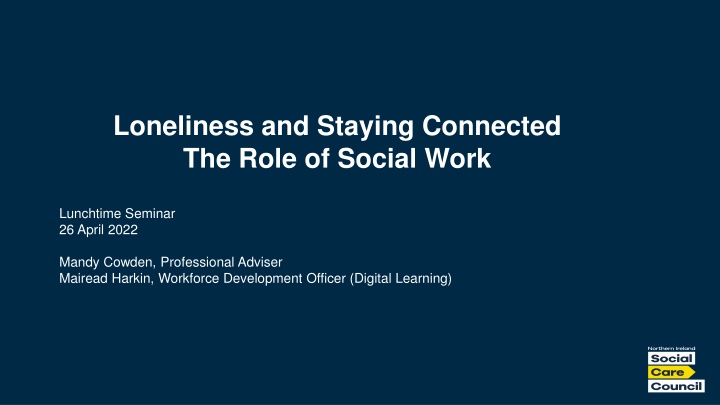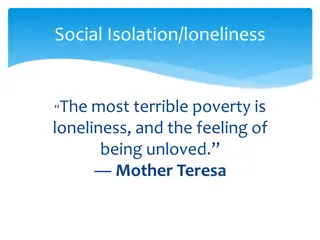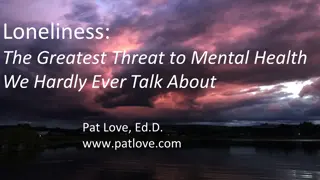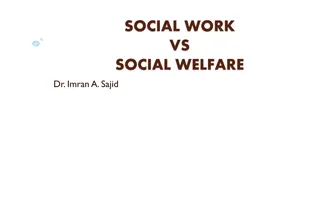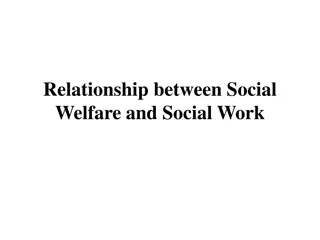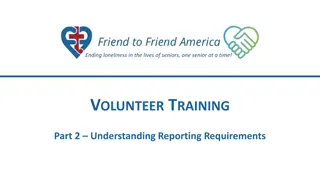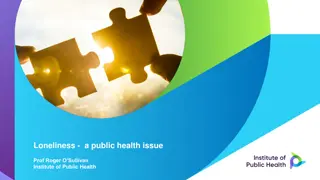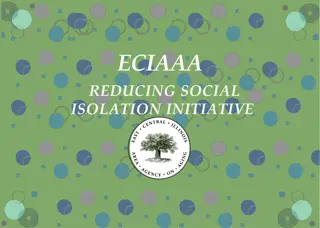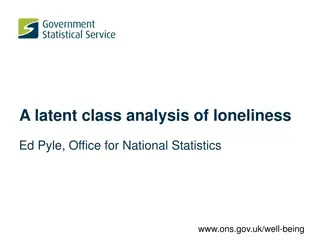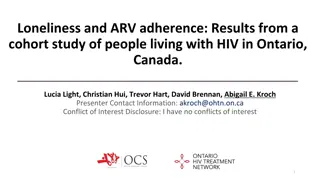Loneliness and Staying Connected The Role of Social Work
This seminar explores why social workers need to address loneliness, providing insights, resources, and practical guidance for supporting individuals experiencing isolation. Learn about the impact of loneliness, effective communication strategies, and self-care techniques essential for combating social isolation.
Download Presentation

Please find below an Image/Link to download the presentation.
The content on the website is provided AS IS for your information and personal use only. It may not be sold, licensed, or shared on other websites without obtaining consent from the author.If you encounter any issues during the download, it is possible that the publisher has removed the file from their server.
You are allowed to download the files provided on this website for personal or commercial use, subject to the condition that they are used lawfully. All files are the property of their respective owners.
The content on the website is provided AS IS for your information and personal use only. It may not be sold, licensed, or shared on other websites without obtaining consent from the author.
E N D
Presentation Transcript
Loneliness and Staying Connected The Role of Social Work Lunchtime Seminar 26 April 2022 Mandy Cowden, Professional Adviser Mairead Harkin, Workforce Development Officer (Digital Learning)
Why Do Social Workers Need to Know about Loneliness? Social workers and social care workers support people who are some of the most at risk of loneliness. 6432 Social Workers registered with the Social Care Council. Be informed- Standards of Practice 2: maintain an up to date knowledge and evidence base: understanding more about loneliness and the importance of prevention and early intervention. DoH Review of Adult Social Care- the provision of services that recognise and tackle root causes of social care need loneliness and social isolation would be another priority for such services p57. Look out for loneliness- Standards of Practice 3: develop social work practice and integrate learning into practice (3.2).
Developing a digital learning resources Jan 2020 Loneliness Expert Working Group formed DOH: March 2020 Covid happened. Shielding, Social Isolation and Staying Connected Resource April 2020. Targeted at social care workers. 2021-2022 Know a lot more about loneliness and being isolated since COVID-19 Redesign and content expansion of the loneliness resource to Loneliness and Staying Connected: A social care resource Throughcollaboration, partnership, co-production, lived experience and user-centred design.
Learning Outcomes By the end of this resource you will be able to: Understand what loneliness is and be able to recognise loneliness. Have an awareness of loneliness and its impact on the people you are supporting. Be aware of the needs of people who are lonely and/or isolated. Be aware of the important and unique role you have in supporting people and helping them stay connected. Understand the importance of communication and how to talk to a person who is lonely and or socially isolated. Know how you can help to reduce the impact of loneliness and social isolation. Know how to report and raise concerns. Understand the importance of self-care and know how to avail of support for yourself. Understand how this resource and learning links to your Standards of Conduct and Practice for Social Care Workers.
Real World Reflective Scenarios Loneliness and Staying Connected (niscc.info)
Loneliness and Staying Connected: Digital Learning Resource for Social Workers Join new expert working group: We would really like to hear what you have to say about loneliness and the role of social workers. Social worker, person accessing services, carer experiences. What are the opportunities and challenges? Share examples of practice.
w: https://learningzone.niscc.info e: Mairead.Harkin@niscc.hscni.net e: Mandy.Cowden@niscc.hscni.net e: Alison.Shaw@niscc.hscni.net
